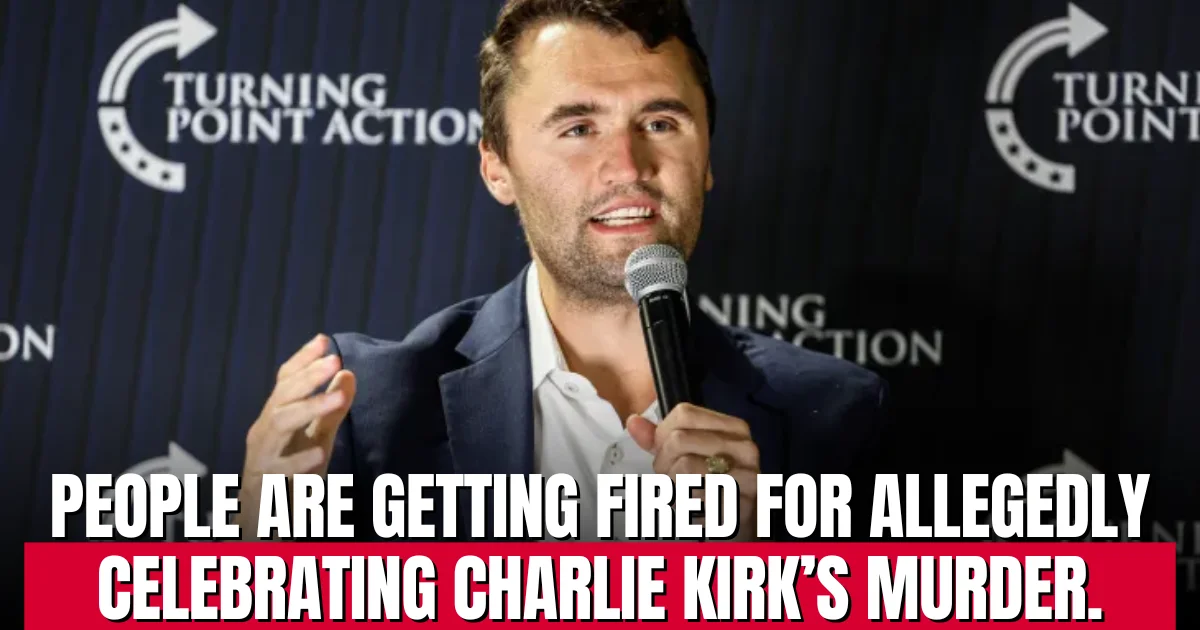Dozens face firings after posts on Charlie Kirk’s murder. Is it free speech or coordinated harassment? Read the full breakdown here.
Table of Contents
People Are Getting Fired for Posts on Charlie Kirk’s Murder: A Coordinated Harassment Campaign?
Introduction
The aftermath of Charlie Kirk’s assassination has sparked not only political outrage but also a wave of online campaigns targeting people who allegedly celebrated his death. From teachers to journalists, dozens of individuals have lost their jobs or faced harassment after their social media posts were highlighted by conservative activists, politicians, and even anonymous doxxing websites.
The controversy raises critical questions about free speech, online harassment, and the blurred lines between accountability and political retaliation.
A Coordinated Effort to Target Posts

In the days following Kirk’s killing, far-right figures such as Laura Loomer and Republican lawmakers amplified posts from individuals accused of celebrating his death.
An anonymous site called “Expose Charlie’s Murderers” claimed to have received nearly 30,000 submissions of such posts. Though it insisted it was “not a doxxing site,” it openly planned to create a searchable database of names, locations, and professions.
Soon after, the site was taken down — but not before it accepted crypto donations and spun off into a rebranded effort under the name “Charlie Kirk Data Foundation.”
Who Is Getting Fired?
The campaign has already resulted in firings across multiple industries:
- Public-sector employees: A Middle Tennessee State University worker was dismissed after posting they had “ZERO sympathy” for Kirk’s death.
- Teachers: GOP Rep. Nancy Mace called out a teacher, who was later confirmed to be fired by their district.
- Private companies: Businesses like Freddy’s Frozen Custard & Steakburgers and even the Carolina Panthers terminated employees over social media posts.
- Media & Entertainment:
- The Washington Post let go of longtime writer Karen Attiah.
- DC Comics canceled a comic series after author Gretchen Felker-Martin’s inflammatory comments.
- Airlines: Delta, American, and United all suspended staff over online remarks about the shooting.
Some firings were linked to explicitly hostile posts. But in other cases, individuals insist their comments were taken out of context, or that they never celebrated Kirk’s death at all.
The Harassment Backlash
Those spotlighted are now facing intense harassment and threats.
- Journalist Rachel Gilmore said she was “terrified” after being targeted, despite clarifying that she hoped Kirk survived.
- Former Florida data scientist Rebekah Jones reported death threats and described the anonymous site as a “hit list.”
Experts warn that the coordinated exposure could incite violence and escalate political polarization.
Free Speech vs. Employment Consequences

The controversy touches on a longstanding legal and ethical debate: Can employers fire workers over social media posts about politics?
- Private companies: In the U.S., most private-sector employees can be fired for any reason, including offensive social media activity.
- Public-sector employees: Protections exist, but if the speech is disruptive or perceived as celebrating political violence, dismissals are often upheld.
Experts point to a 1987 Supreme Court ruling protecting a worker’s right to criticize political figures, but note that in today’s hyper-partisan climate, employers are quick to act under public pressure.
Expert Insights: A Culture War Escalation
Scholars warn that this moment is part of a broader political weaponization of speech.
- Whitney Phillips, an information politics professor, noted that framing critics of Kirk as “enemies” feeds into a false culture war narrative.
- Hank Teran, CEO of Open Measures, said the website’s framing implied those named were responsible for Kirk’s death — even if they weren’t — potentially inciting more harassment.
Conclusion
The fallout from Charlie Kirk’s murder is extending far beyond the investigation into his killing. It has ignited a coordinated effort to expose, punish, and harass individuals online, blurring the lines between accountability and mob justice.
As more people face professional consequences for their posts, the controversy raises urgent questions about digital free speech, political polarization, and the future of online expression in America.
FAQs
1. Why are people being fired after Charlie Kirk’s murder?
Many lost their jobs after social media posts about Kirk’s assassination were spotlighted by activists and politicians, leading to public pressure on employers.
2. Is posting about Kirk’s death illegal?
No. But posts perceived as celebrating violence can result in professional consequences, especially for public-facing roles.
3. What was the “Expose Charlie’s Murderers” website?
An anonymous site that published names and details of people who posted about Kirk’s death. It has since been taken down and rebranded.
4. Are these firings a violation of free speech?
Free speech protects against government censorship, not employment consequences. Private employers can often fire employees for public statements.
5. What does this mean for online free expression?
It highlights the growing risks of digital speech, where posts can be weaponized, amplified, and tied to real-world consequences in polarized political climates.
